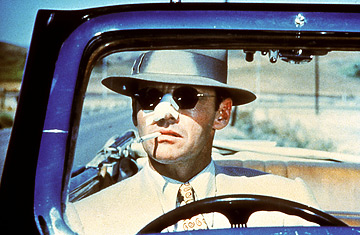
Jack Nicholson in Chinatown, 1974.
1974; Director: Roman Polanski; Writer: Robert Towne
With Jack Nicholson, Faye Dunaway, John Huston
Paramount Home Video
Available Nov. 6, List Price $14.99
"Middle of a drought and the water commissioner drowns,"the county coroner drily notes. "Only in L.A."The death of the water commissioner is the beginning and the crux of a plot as twisty as Mulholland Drive. J.J. Gittes (Nicholson), a private eye specializing in divorce cases, is hired to get some dirt on that commissioner. He gets tangled up with the man's wife (Dunaway), spars with the wife's powerful father Noah Cross (Huston) and learns, painfully, what happens to nosy people: they get their noses cut. Gittes tells one cop he used to work with, "You're dumber than you think I think you are."In fact, Gittes is the ignorant one. Virtually every insight he has into the case is wrong, sometimes fatally so.
Towne's magnificent script was an epic vision of Los Angeles disguised as a murder mystery. Beneath the whodunit conundrum, the writer embedded a history lesson showing, as he says in the extras here, "the way the city of Los Angeles basically stole the water of the Owens Valley and brought it to the San Fernando Valley."Towne transposed that 1908 scandal to 1937, added sexual betrayal and trauma to the political corruption, and seeded a wonderful film about, Towne says, "the futility of good intentions."
The Hollywood of the '70s rediscovered the America (and the Hollywood) of the '30s. In films like Paper Moon, The Day of the Locust, Dillinger and others, that old decade was rendered in diffuse lighting — instant visual nostalgia — that had nothing to do with the clarity of '30s black-and-white. Chinatown too has a soft-focus sheen to it, but its textual template is the work of Raymond Chandler in his Philip Marlowe novels.
Gittes is the Chandler hero reconfigured as a smooth-talking chump. (And since the private eye is in every scene in the film, he's our eyes, our brain; thus we're as flummoxed as he is by the film's resolution.) Gittes is an expert at peeping into other people's bedrooms but not at locating the darkness of the human heart. As Cross tells him, "Most people never have to face the fact that, at the right time and the right place, they're capable of... anything!"In Chinatown, the anything is horrifying and sobering. There's a climactic twist (which I won't reveal; see the damn movie) that still has the power of an electric shock, and an ending so bleak no studio head would OK it today.
At the time, Paramount's production chief was the film's producer: Robert Evans (star of his own documentary, The Kid Stays in the Picture). He joins Nicholson, Towne and Polanski in the 54 mins. of making-of extras produced by Laurent Bouzereau. We hear how Evans, whom Polanski calls "the head of production and the head of seduction,"lured the Polish director back to work in L.A. for the first time since his wife Sharon Tate had been slaughtered by the Charles Manson gang. Polanski calls the assignment "a job more than a work of passion or heart,"but spent weeks reshaping the script with the young writer, to whom he gave a book called How to Write a Screenplay, cheekily inscribing it, "To my dear partner, with hope. Roman."No question that Towne is the author of the script — really, of this story-driven film — but the ending was the director's idea.
Nicholson recalls Polanski telling him to spit out the reams of dialogue much faster than usual, both to give viewers a sense of Gittes' (misplaced) self-assurance and because "if I talked and took my normal rhythms, the movie would be seven hours long."(As it is, Chinatown runs a sleek, engrossing 2hr. 10mins.) The comments by the principles are so engrossing, I'm sorry that this "Special Collector's Edition"doesn't have a commentary track. Much remains to be said about Chinatown, which is now worthy of its own nostalgia: for a time when a big-studio movie from an original script could dive so confidently into the dark eddies of lust, greed and power.